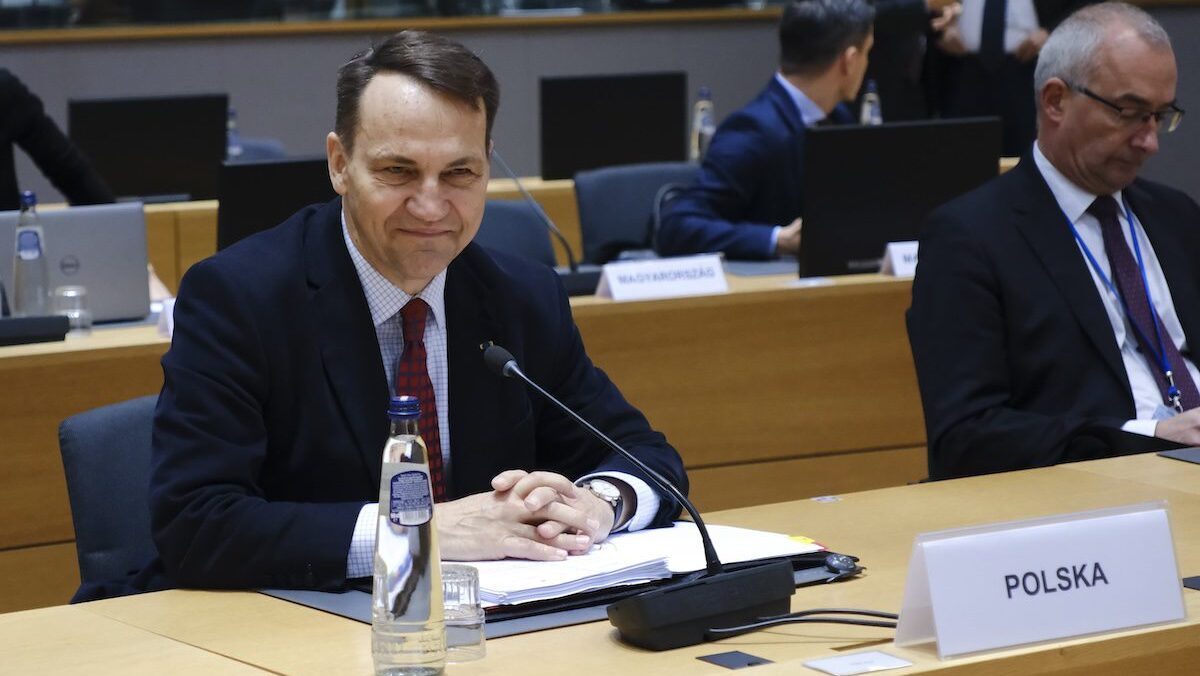
Polish Foreign Minister Radosław Sikorski.
Photo: European Council, 2024 © European Union
The EU is preparing to for the first time bypass member states’ individual veto rights when voting about the upcoming 16th sanctions package against Russia, which is planned to be released on the third anniversary of Ukraine’s 2022 invasion in February.
While foreign policy decisions would normally require unanimous consent of all member states, as per the EU treaties, the EU Council is reportedly planning to change the procedure by downgrading the vote to the ministerial level—by labeling it “trade” instead of foreign policy—where a qualified majority (half of member states, representing two-thirds of EU population) is enough for it to pass.
Polish Foreign Minister Radosław Sikorski bragged about this stunt on his X page, admitting that the goal is to prevent countries like Hungary and Slovakia from exercising their—legitimate—veto rights if they believe that some elements of the package would be counterproductive or hurt Europe’s economy more than Russia’s.
The foreign minister’s wording also implies that eliminating the veto in a key decision-making process may not be an isolated case but the beginning of a new standard, which many conservative voices in Europe have been warning about as a gradual erosion of member state sovereignty and the beginning of an EU “superstate.”
“God uses all sorts of people for his [sic] purposes. Thanks to PiS [Law and Justice], European funds are dependent on compliance with the rule of law. Thanks to [PM Viktor] Orbán, we are moving from the liberum veto in matters of sanctions,” Sikorski wrote on Wednesday, January 15th.
Pan Bóg do swoich celów posługuje się najróżniejszymi ludźmi.
— Radosław Sikorski 🇵🇱🇪🇺 (@sikorskiradek) January 15, 2025
Dzięki PiS mamy uzależnienie funduszy europejskich od przestrzegania praworządności.
Dzięki V.Orbanowi w sprawach sankcji odchodzimy od liberum veto. https://t.co/XE9mJbiyaB
In both cases that the minister referred to—tying all EU funds to ideologically driven rule-of-law standards and stripping member states of their veto rights—Donald Tusk’s liberal Polish government appears to play a key role. Warsaw recently assumed the EU Council’s six-month rotating presidency, and seems to be bent on using this time to speed up the ongoing power transfer between the nation-states and Brussels.
Sikorski’s comment was a reply to reporting from the Polish RMF24, which wrote that the issue came up already during the first round of consultations between EU ambassadors and the European Commission.
According to the website, the plan arose that “for the first time in case of sanctions, the decision should not be taken unanimously, but by a qualified majority, as it would concern trade [and not foreign policy]. Hungary and Slovakia would not have the right to veto.”
But if it was so obvious that economic sanctions against a third country such as Russia fall under the “trade” category, it begs the question of why the previous fifteen sanctions packages were passed as “foreign policy” decisions. It’s clear that Brussels now needs—and is willing—to violate member states’ rights to continue pursuing its questionable sanctions policies.
The key element in the package that likely prompted this unusual approach is the plan to massively raise customs duties on already sanctioned Russian fertilizers so that exporting them to the EU becomes unprofitable for Moscow.
The war and subsequent sanctions on Russian fertilizers such as potash, nitrogen, and phosphate not only caused the prices to skyrocket in the EU and throughout the world, but even led to the UN issuing stark warnings about their threat to global food security.
While a UN-brokered deal allowed Russian exports to continue making their way to the Global South, the EU continues trying to prevent its member states from accessing them. As in the case of oil and gas, alternative supplies are now available for Europe, but the massive price difference will have to be paid—first by the farmers and then by consumers.
This is what Brussels is afraid Hungary and Slovakia might want to veto for the good of their agricultural sector and their citizens. Of course, the opportunity to switch to qualified majority voting also serves the purpose of providing a precedent on which to base similar decisions in the future and steadily “move away” from veto rights in all other areas, as Sikorski suggested.
